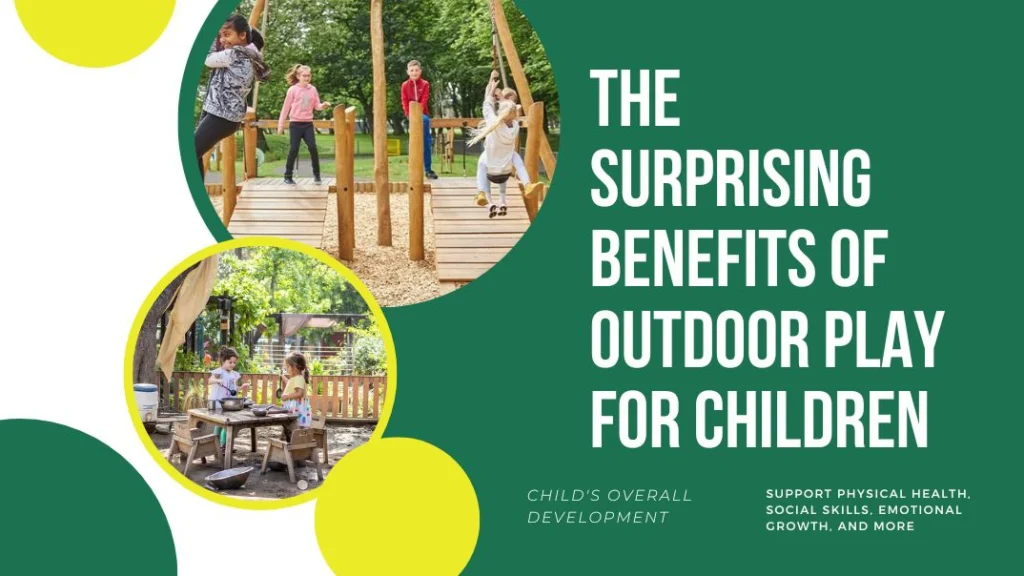Every parent wants the best for their child. We constantly seek activities that promote their well-being. One such activity that often gets overlooked is outdoor play. Why should kids play outside?
Outdoor play offers numerous benefits that contribute to a child’s overall development. It supports physical health, social skills, emotional growth, and more.
Outdoor play helps children build strong muscles and bones through physical activities such as running, jumping, and climbing. These activities promote cardiovascular health and can prevent childhood obesity. Furthermore, outdoor play enhances motor skills, coordination, and balance, making children more active and healthier.
In addition to physical benefits, the benefits of outdoor play extend to social development. Children play together outside, they learn to communicate, share, and collaborate, developing crucial social skills and building friendships. Outdoor play provides opportunities for children to resolve conflicts and practice problem-solving in a natural setting.
Emotionally, outdoor play offers children a sense of freedom and adventure. It encourages them to explore, take risks, and overcome challenges, which builds confidence and resilience. The benefits of outdoor play include nature’s calming effect that reduces stress and anxiety in children, promoting better mental health.
Let’s explore why encouraging outdoor play is vital for children’s development.
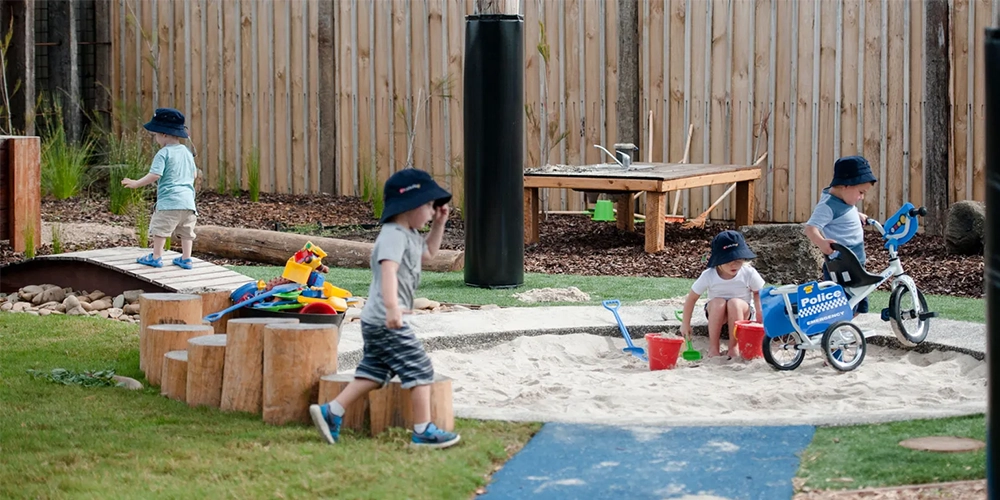
Exploring the Benefits of Outdoor Play for Children
Outdoor play is not just fun; it’s essential for a child’s growth and development. Engaging in outdoor activities provides numerous benefits that contribute to their physical, social, and emotional well-being. Let’s explore these advantages in detail.
How Outdoor Play Encourages Scientific Exploration
One of the key benefits of outdoor play is that it encourages children to learn about science naturally. When kids spend time outside, they can observe and interact with nature. They can watch insects, study plants, and understand weather patterns firsthand. These experiences make scientific concepts more tangible and accessible, fostering a genuine curiosity about the world around them.
Children can conduct simple experiments, like watching plants grow or how different surfaces react to water. These activities nurture their curious minds and lay the foundation for a lifelong interest in science.
Social Skills Development Through Outdoor Play
Playing outside creates countless opportunities for children to interact and collaborate with their peers. Whether they are playing team sports, building a fort, or engaging in group games, children learn vital social skills. They practice sharing, taking turns, and working together towards a common goal. These interactions are crucial for developing empathy, understanding, and resolving conflicts.
Outdoor play also helps children develop communication skills. They learn to express themselves clearly and listen to others as they negotiate roles in games or solve problems together. These skills are essential for building strong relationships throughout their lives.
Physical Health Benefits of Being Outdoors
One of the most significant benefits of outdoor play is the positive impact on physical health. Children naturally engage in physical activities like running, jumping, and climbing when they are outside. These activities help build strong muscles and bones, improve cardiovascular health, and maintain a healthy weight.
Outdoor play also promotes better coordination, balance, and motor skills. Kids who play outside are more likely to be physically active and develop healthy exercise habits that can last a lifetime.
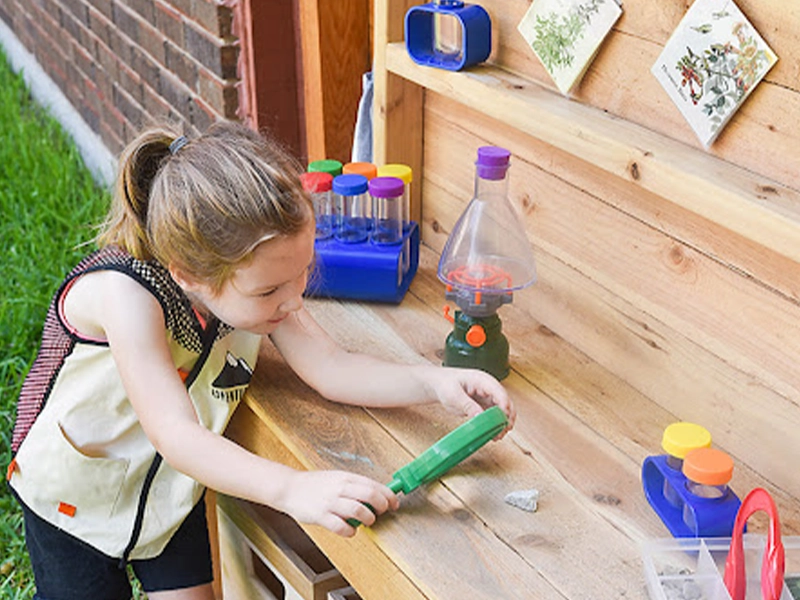
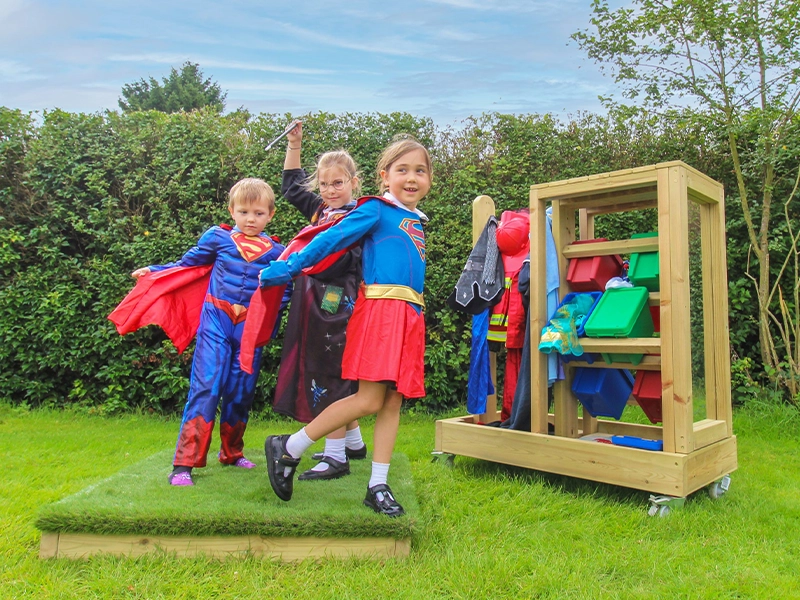
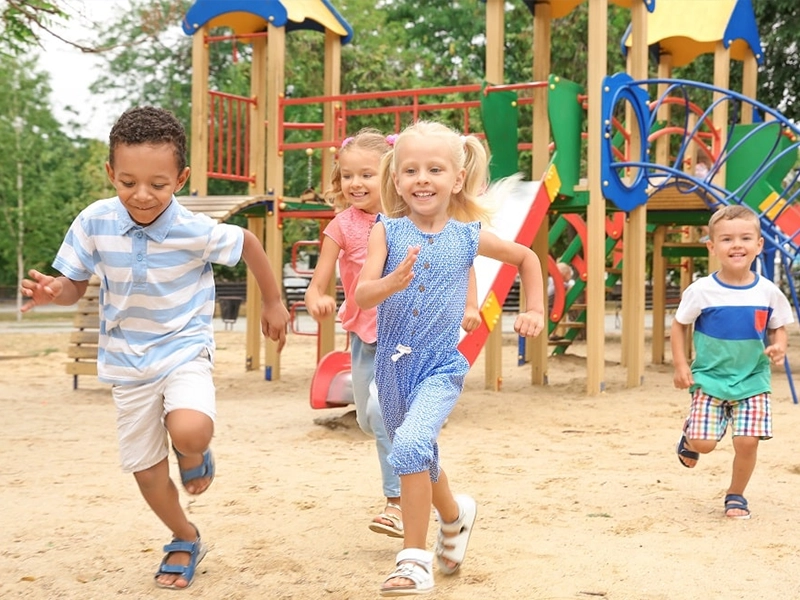
Learning in New Environments
Outdoor play provides unique and stimulating learning environments that indoor settings cannot match. Children can learn about geography by exploring different landscapes, such as forests, hills, and streams. They can practice counting and measuring using natural objects like rocks and sticks.
This type of play encourages creativity and critical thinking. For instance, when building a shelter or creating a game, children must plan, solve problems, and think strategically. These experiences enhance cognitive development and academic skills.
Improved Sleep Patterns
Another significant benefit of outdoor play is improved sleep quality. Physical activity during the day helps children fall asleep more easily at night. Exposure to natural light also helps regulate their sleep-wake cycles, leading to better sleep patterns.
Adequate sleep is crucial for a child’s development. It affects their mood, attention, and ability to learn. Parents can help children enjoy more restful and rejuvenating sleep by providing plenty of outdoor playtime.
Taking Safe Risks
Outdoor play allows children to take appropriate risks in a controlled environment. Climbing trees, balancing on beams, and exploring new areas can be thrilling and help build confidence. Learning to assess and manage risks is an important life skill children develop through these experiences.
Taking risks also helps children overcome fears and build resilience. They learn it’s okay to fail and try again, fostering a growth mindset and perseverance.
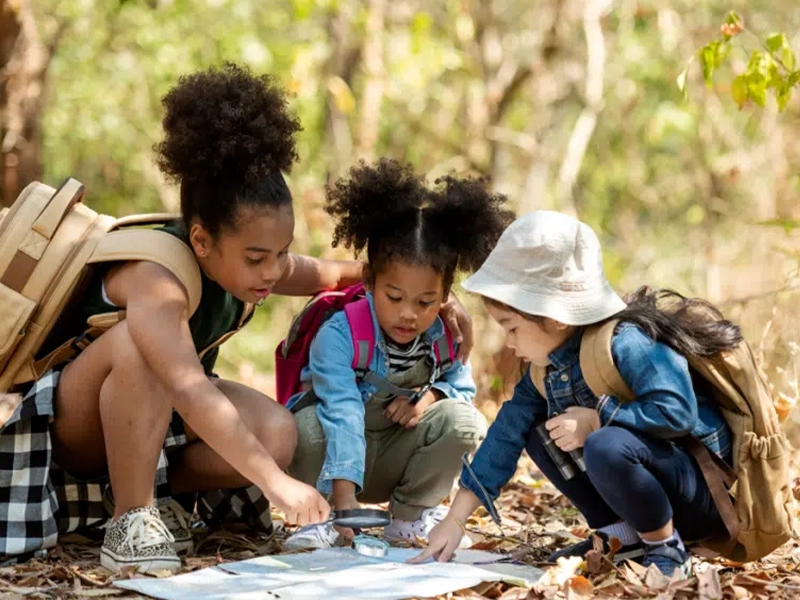

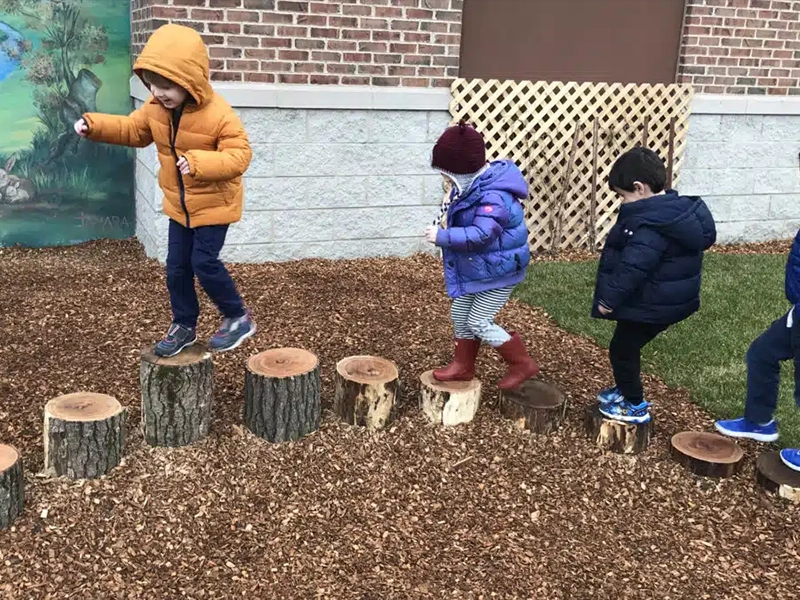
Physical Benefits of Outdoor Play for Children
Outdoor play significantly contributes to children’s physical development. Here’s how:
- Enhanced Motor Skills: When children engage in outdoor activities such as running, jumping, and climbing, they develop advanced motor skills. These activities require coordination, balance, and agility, helping children improve their physical abilities. For example, when a child climbs a tree, they use their arms and legs to pull themselves up, enhancing their muscle strength and coordination. Balancing on a log or jumping over a stream helps them develop agility and balance, which are crucial for physical development. Moreover, outdoor play often involves a variety of movements that are not typically found in indoor play. Children might run on uneven surfaces, crawl under bushes, or swing from tree branches. These diverse activities enhance their motor skills in ways structured indoor activities cannot.
- Healthy Weight Maintenance: Outdoor play encourages children to be active, which helps maintain a healthy body mass index (BMI). Regular physical activity is essential in preventing childhood obesity and promoting a healthy lifestyle. When children play outside, they engage in vigorous activities that burn calories and strengthen their muscles. This natural exercise helps them maintain a healthy weight and reduces the risk of obesity-related health issues. Additionally, outdoor play can appeal more to children than structured exercise routines. Games like tag, hide and seek, or soccer are fun and engaging, making children more likely to want to participate. By enjoying their playtime, children get the exercise they need without feeling like they are being forced to work out.
- Improved Overall Health: Playing outside boosts children’s overall health. It strengthens their cardiovascular system, improves lung capacity, and bolsters the immune system. Natural exposure to sunlight also aids in producing vitamin D, which is crucial for healthy bone development. Children who spend time outdoors are often more nutritious and have a reduced risk of developing chronic illnesses. Moreover, outdoor play can help improve children’s respiratory health. Breathing in fresh air while running and playing helps expand their lung capacity and improve oxygen intake. This is especially important for children with asthma or other respiratory conditions, as regular outdoor play can help strengthen their lungs and reduce symptoms.
- Increased Muscle Strength: Outdoor activities like climbing trees, playing in jungle gyms, and lifting objects help build muscle strength. Stronger muscles contribute to better endurance, physical performance, and overall health. For instance, when children engage in activities requiring them to push, pull, or lift objects, they build their muscle strength and improve their physical abilities. Furthermore, the varied terrain and natural obstacles outdoors allow children to engage their muscles differently. Walking uphill, jumping over rocks, or crawling through tunnels all help to strengthen various muscle groups and improve overall fitness.
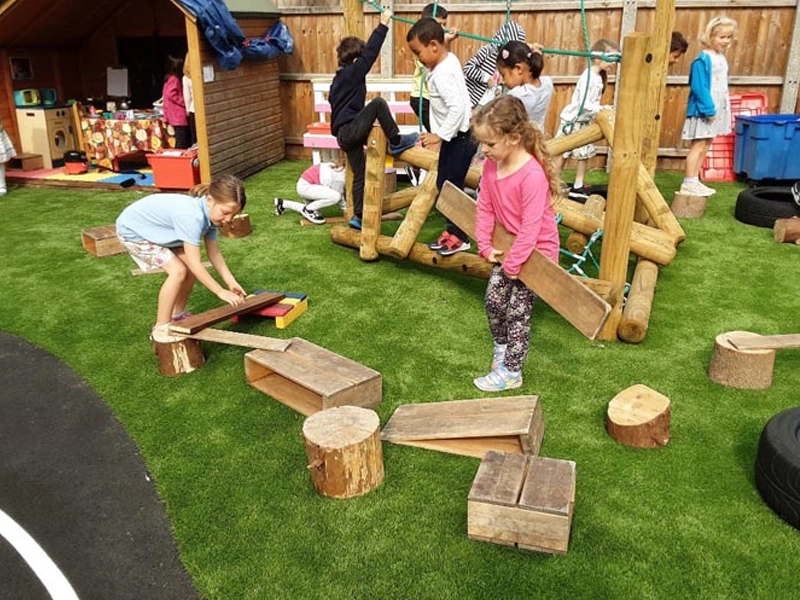
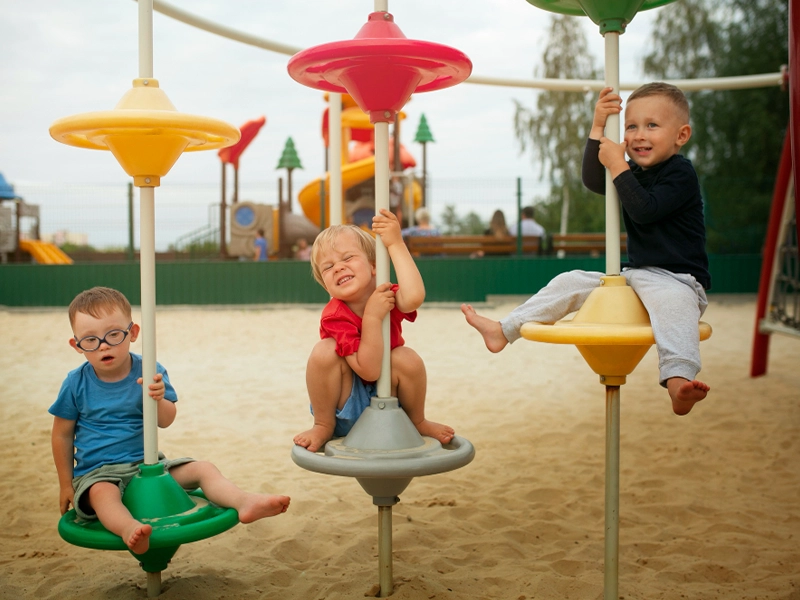

Social Benefits of Outdoor Play for Children
Outdoor play is not only beneficial for physical health but also for social development. Let’s look at some of these social benefits.
- Better Communication Skills: Playing outside with peers helps children learn how to communicate effectively. They practice talking, listening, and understanding non-verbal cues, which are essential for developing strong communication skills. For instance, when children play games that require them to follow rules or work together to achieve a goal, they must communicate clearly and effectively. Additionally, outdoor play often involves more significant groups of children, providing more opportunities for social interaction. This helps children learn to navigate social situations, develop friendships, and improve their communication skills.
- Increased Self-Awareness: Outdoor play allows children to learn more about themselves. They discover their strengths, preferences, and limits through various activities. This self-awareness helps build confidence and a strong sense of identity. For example, a child who excels at climbing may develop a sense of pride and confidence in their physical abilities. Moreover, outdoor play often involves exploration and discovery, which can help children learn about their interests and passions. Whether they enjoy observing wildlife, building structures, or playing sports, these experiences help them understand what they want and are good at.
- Appreciation for the Environment: Spending time outdoors fosters a deeper appreciation for nature. Children learn to respect and care for the environment, encouraging them to become responsible stewards of the planet. For instance, when children play in a park or natural setting, they learn about preserving these spaces for future generations. Furthermore, outdoor play can teach children about the interconnectedness of all living things. They may observe how plants and animals interact, learn about the food chain, and understand the importance of protecting natural habitats. These experiences can inspire a lifelong commitment to environmental conservation.
- Enhanced Peer Relationships: Outdoor play encourages interaction with peers, which helps children form and strengthen friendships. They learn to work as a team, share resources, and resolve conflicts, vital skills for developing healthy relationships. For example, when children play team sports or engage in group activities, they must cooperate and communicate effectively. Additionally, outdoor play often involves unstructured, imaginative play, which can help children develop deeper connections with their peers. Children learn to trust and rely on each other by creating games and stories and building solid and lasting friendships.
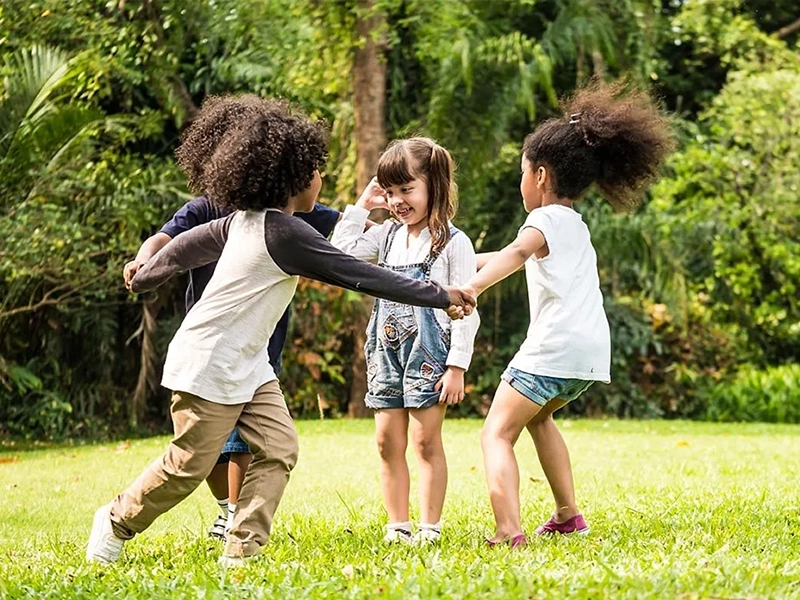

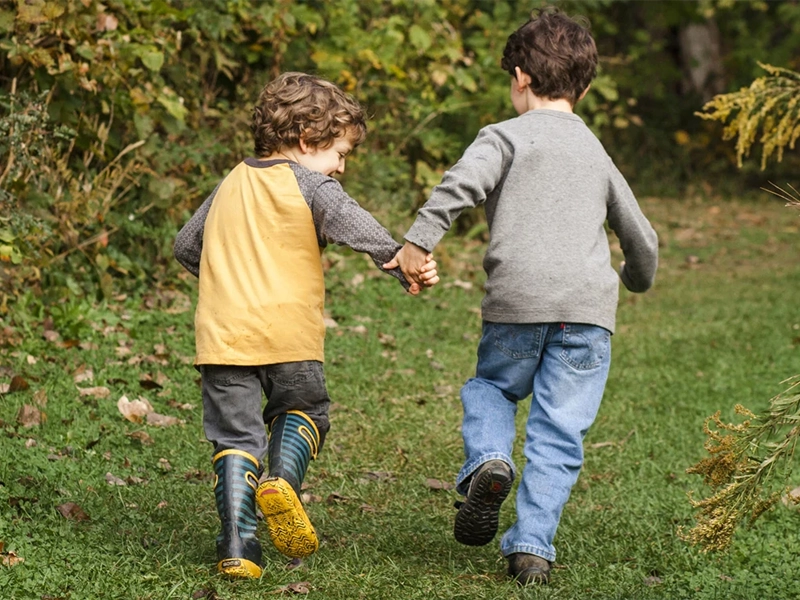
Emotional Benefits of Outdoor Play for Children
Outdoor play also supports emotional development, providing children opportunities to grow emotionally and mentally.
- Full Sensory Engagement: Children who play outside engage all five senses. They feel the texture of leaves, hear the sounds of birds, see the colors of flowers, smell the fresh air, and sometimes even taste fruits from trees. This multi-sensory engagement is crucial for sensory development and cognitive growth. For instance, touching different textures helps children develop tactile awareness while listening to natural sounds enhances auditory processing. Moreover, engaging all the senses can help children feel more connected to their environment and enhance their overall sensory experiences. This can lead to improved cognitive development and a greater understanding of the world around them.
- Encourages Independence: Outdoor play allows children to explore, make decisions, and solve problems independently. These experiences foster independence and confidence as children learn to rely on their abilities. For example, when a child navigates a new playground or create their own games, they develop a sense of autonomy and self-reliance. Furthermore, outdoor play often involves taking risks and facing challenges, which can help children build resilience and confidence. By overcoming obstacles and solving problems independently, children learn to trust their abilities and develop a strong sense of self-efficacy.
- Promotes Self-Reflection: Nature provides a calming environment where children can reflect on their thoughts and feelings. This self-reflection is essential for emotional regulation and developing a sense of self. For example, sitting quietly by a stream or watching the clouds can provide a peaceful space for children to process their emotions and thoughts. Additionally, outdoor play can help children develop mindfulness and a sense of presence. By focusing on their surroundings and being in the moment, children can learn to manage stress and anxiety more effectively.
- Builds Resilience: Outdoor play often involves challenges and risks, like climbing trees or navigating uneven terrain. Learning to overcome these challenges helps children build resilience, teaching them that it’s okay to take risks and try again after failure. For example, a child who falls off a bike but gets back on and tries again learns the value of perseverance and determination. Furthermore, facing and overcoming challenges in outdoor play can help children develop a growth mindset. By understanding that failure is a part of learning and growth, children can become more resilient and adaptable in the face of difficulties.
The Importance of Outdoor Play for Younger vs. Older Children
Outdoor play is essential for children of all ages, offering many benefits that support their physical, social, and emotional development. The benefits of outdoor play vary for younger and older children, addressing their unique developmental needs.
Benefits of Outdoor Play for Younger Children
Younger children, such as toddlers and preschoolers, benefit from outdoor play.
For younger children, outdoor play is essential for developing gross motor skills. Running, jumping, and climbing help build strong muscles and improve coordination. Outdoor play also encourages younger children to engage in activities that promote cardiovascular health and help prevent childhood obesity.
Playing outside with other children helps younger kids learn to communicate and interact with their peers. They practice sharing, taking turns, and cooperating with others, which are foundational social skills. These interactions during outdoor play are crucial for their social development and help them build early friendships.
Outdoor play provides younger children with a sense of freedom and adventure. It allows them to explore their environment, take risks, and overcome small challenges, which builds confidence and resilience. Additionally, being in nature has a calming effect, reducing stress and anxiety in younger children.
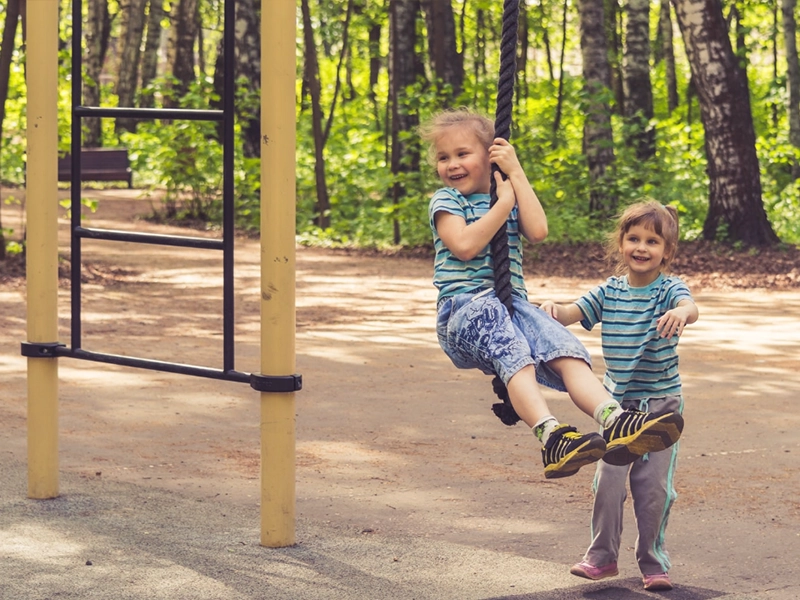
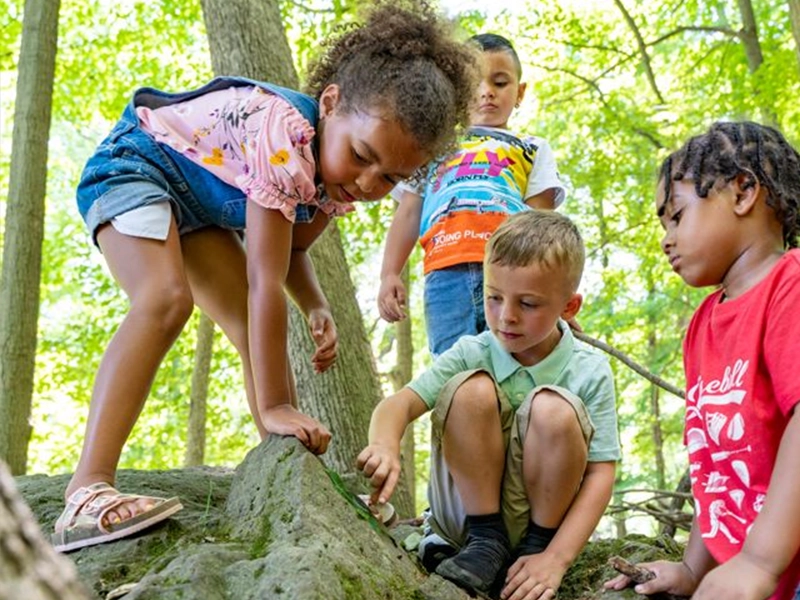
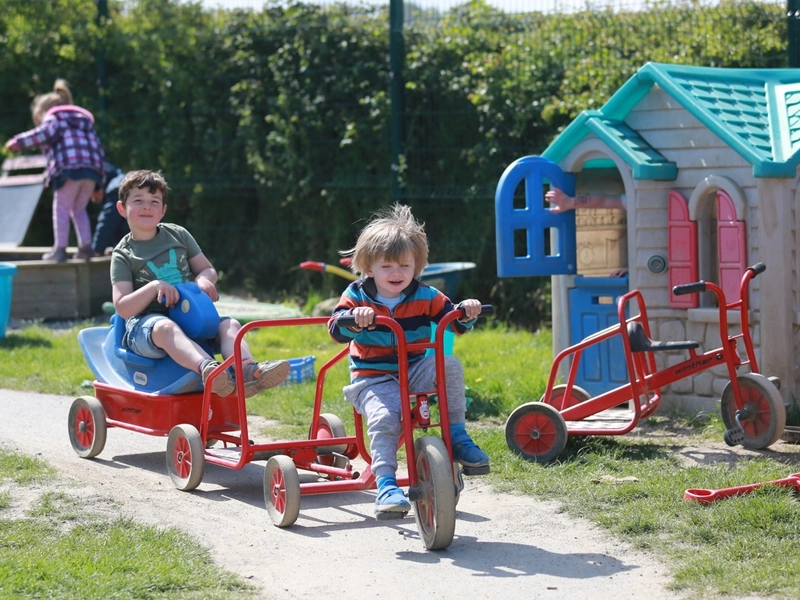
Benefits of Outdoor Play for Older Children
As children grow older, the benefits of outdoor play continue to be significant, but they evolve to meet their changing needs.
For older children, outdoor play remains vital for physical fitness. It helps them stay active and maintain a healthy weight. Engaging in sports or more complex physical activities, such as hiking or team games, enhances their physical endurance, strength, and overall health.
Outdoor play for older children often involves more complex social interactions. They learn to work as part of a team, negotiate rules, and develop leadership skills. These experiences are essential for building strong peer relationships and improving communication skills.
Older children benefit from outdoor play through cognitive development. Activities that require strategy, problem-solving, and critical thinking, such as building a fort or planning a game, stimulate their minds. Outdoor environments provide diverse learning experiences that indoor settings cannot match, fostering creativity and intellectual growth.
For older children, outdoor play continues to be an essential outlet for reducing stress and anxiety. It offers a break from academic pressures and screen time, promoting mental well-being. The sense of accomplishment from overcoming physical challenges or achieving goals in sports boosts self-esteem and resilience.
The benefits of outdoor play are extensive for children of all ages. For younger children, outdoor play is crucial for physical development, social skills, and emotional growth. As children age, outdoor play supports physical fitness, advanced social interactions, cognitive development, and mental health. Encouraging outdoor play at every stage of childhood is essential for fostering well-rounded and healthy individuals.
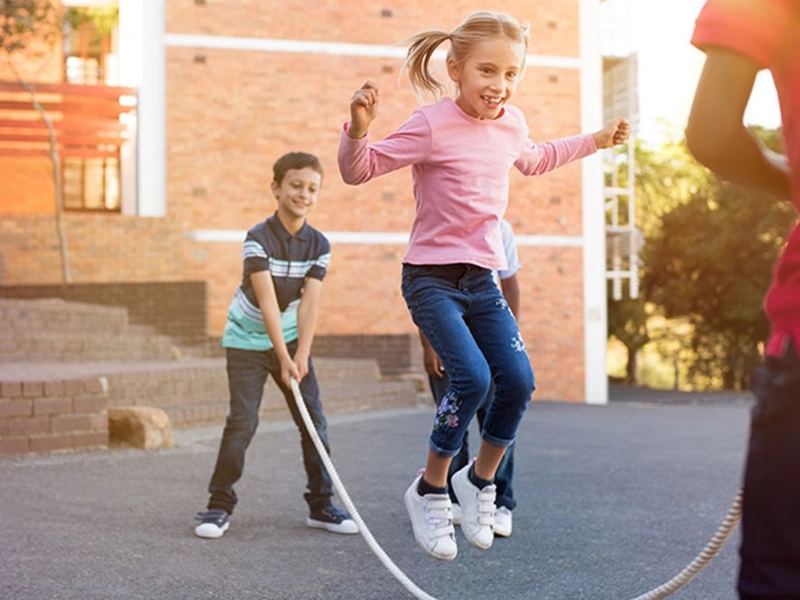
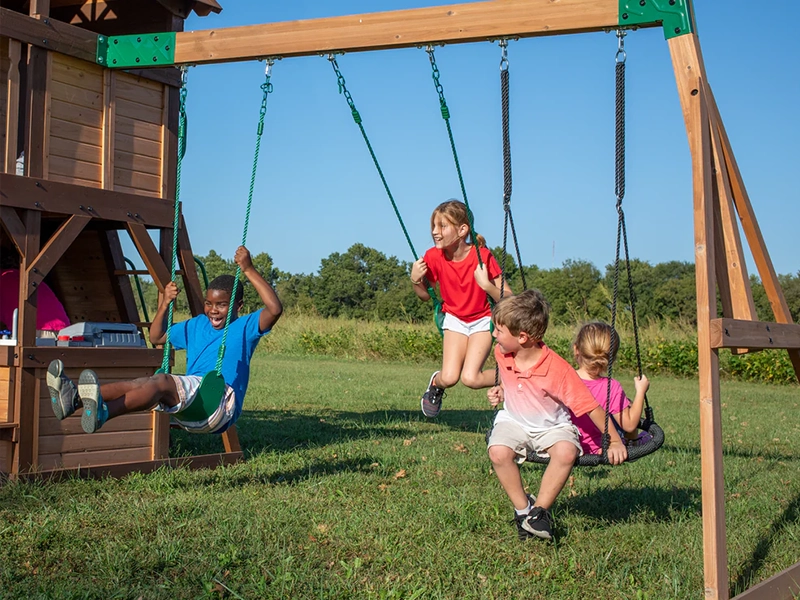
The benefits of outdoor play for children are extensive and multi-dimensional. The advantages are apparent from enhancing physical health by building strong muscles and improving cardiovascular fitness to fostering social skills through communication, sharing, and teamwork. Outdoor play supports emotional growth by providing freedom and adventure, helping children build confidence and resilience. Additionally, it offers cognitive benefits by stimulating creativity and enhancing learning through hands-on experiences with nature.
Encouraging children to play outside supports their holistic development and helps them grow into well-rounded individuals. The wide-ranging benefits of outdoor play underscore its importance in promoting physical, social, emotional, and cognitive well-being. Parents, educators, and caregivers must prioritize outdoor play to ensure children reap these benefits and enjoy a healthy childhood.

